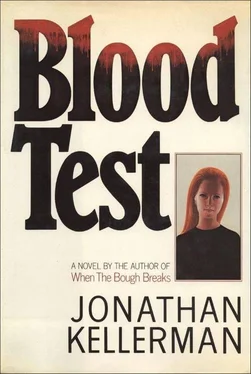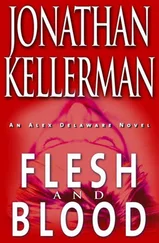Jonathan Kellerman - Blood Test
Здесь есть возможность читать онлайн «Jonathan Kellerman - Blood Test» весь текст электронной книги совершенно бесплатно (целиком полную версию без сокращений). В некоторых случаях можно слушать аудио, скачать через торрент в формате fb2 и присутствует краткое содержание. Город: New York, Год выпуска: 1986, ISBN: 1986, Издательство: Atheneum, Жанр: Триллер, на английском языке. Описание произведения, (предисловие) а так же отзывы посетителей доступны на портале библиотеки ЛибКат.
- Название:Blood Test
- Автор:
- Издательство:Atheneum
- Жанр:
- Год:1986
- Город:New York
- ISBN:978-0689116346
- Рейтинг книги:4 / 5. Голосов: 1
-
Избранное:Добавить в избранное
- Отзывы:
-
Ваша оценка:
- 80
- 1
- 2
- 3
- 4
- 5
Blood Test: краткое содержание, описание и аннотация
Предлагаем к чтению аннотацию, описание, краткое содержание или предисловие (зависит от того, что написал сам автор книги «Blood Test»). Если вы не нашли необходимую информацию о книге — напишите в комментариях, мы постараемся отыскать её.
Blood Test — читать онлайн бесплатно полную книгу (весь текст) целиком
Ниже представлен текст книги, разбитый по страницам. Система сохранения места последней прочитанной страницы, позволяет с удобством читать онлайн бесплатно книгу «Blood Test», без необходимости каждый раз заново искать на чём Вы остановились. Поставьте закладку, и сможете в любой момент перейти на страницу, на которой закончили чтение.
Интервал:
Закладка:
“You don’t think they turned the Swopes around?”
“They may have been the straw that broke it,” she conceded, “but I don’t see how they could be entirely responsible. Raoul’s looking for a scapegoat, for easy answers. That’s his style. Most of the docs are like that. Instant fix-its for complex issues.”
She looked away and folded her arms across her chest.
“I’m really tired of all of it,” she said softly.
I steered her back to the Swopes.
“Raoul wondered if the parents’ being older had anything to do with it. You pick up any hints the boy was an unwanted accident?”
“I didn’t get close enough to even touch on stuff like that. I was lucky to get enough for a bare-bones intake. The father smiled and called me “dear” and made sure I never got enough time alone with his wife to develop a relationship. This family’s armored. Maybe they’ve got lots of secrets they don’t want coming out.”
Maybe. Or maybe they’re terrified at being in a strange environment so far from home with a gravely ill child and don’t want to strip themselves bare in front of strangers. Maybe they don’t like social workers. Maybe they’re simply private people. Lots of maybes...
“What about Woody?”
“A cutie pie. He’s been sick since he got here, so it’s hard to judge what kind of kid he really is. Seems like a little sweetie — isn’t it always the sweet ones who suffer?” She took out a tissue and blew her nose. “Can’t stand the air in here. Woody’s a nice little boy who’s agreeable and kind of passive. A people pleaser. He cries during procedures — the spinal tap really hurt him — but he holds still and gives no serious problems.” She stopped for a moment and fought tears.
“It’s a goddamn crime, their pulling him out of treatment. I don’t like Melendez-Lynch, but goddamn it, he’s right this time! They’re going to kill that little boy because somehow we screwed up, and it’s driving me nuts.”
She pounded a small fist on the desk, snapped herself to a standing position, and paced the cramped office. Her lower lip quivered.
I stood up and put my arms around her and she buried her head in the warmth of my jacket.
“I feel like such a fool!”
“You’re not.” I held her tightly. “None if it is your fault.”
She pulled away and dabbed at her eyes. When she seemed composed I said, “I’d like to meet Woody.”
She nodded and led me to the Laminar Airflow Unit.
There were four modules, placed in series, like rooms in a railroad flat, and shielded from one another by a wall of curtain that could be opened or drawn by pushing buttons inside each room. The walls of the units were transparent plastic and each room resembled an oversized ice cube, eight feet square.
Three of the cubes were occupied. The fourth was filled with supplies — toys, cots, bags of clothing. The interior side of the curtained wall in each room was a perforated gray panel — the filter through which air blew audibly. The doors of the modules were segmented, the bottom half metal and closed, the top plastic, and left ajar. Microbes were kept out of the opening by the high speed at which the air was expelled. Running parallel to all four units were corridors on both sides, the rear passage for visitors, the front for the medical staff.
Two feet in front of the doorway to each module was a no-entry area marked off by red tape on the vinyl floor. I stood just outside the tape at the entrance of Module Two and looked at Woody Swope.
He lay on the bed, under the covers, facing away from us. There were plastic gloves attached to the front wall of the module, which permitted manual entry into the germ-free environment. Beverly put her hands inside them and patted him on the head gently.
“Good morning, sweetie.”
Slowly and with seeming effort, he rolled over and stared at us.
“Hi.”
A week before Robin left for Japan, she and I went to an exhibition of photographs by Roman Vishniac. The pictures had been a chronicle of the Jewish ghettos of Eastern Europe just before the Holocaust. Many of the portraits were of children, and the photographer’s lens had caught their small faces unaware, flash-freezing the confusion and terror it found there. The images were haunting, and afterward we cried.
Now, looking into the large dark eyes of the boy in the plastic room, these same feelings came back in a rush.
His face was small and thin, the skin stretched across delicate bone structure, translucently pale in the artificial light of the module. His eyes, like those of his sister, were black, and glassy with fever. The hair on his head was a thick mop of henna-colored curls. Chemotherapy, if it ever happened, would take care of those curls in a brutal, though temporary, reminder of the disease.
Beverly stopped stroking his hair and held out her glove. The boy took it and managed a smile.
“How we doing this morning, doll?”
“Okay.” His voice was soft and barely audible through the plastic.
“This is Dr. Delaware, Woody.”
At the mention of the title he flinched and moved back on the bed.
“He’s not the kind of doctor who gives shots. He just talks to kids, like I do.”
That relaxed him somewhat, but he continued to look at me with apprehension.
“Hi, Woody,” I said. “Can we shake hands?”
“Okay.”
I put my hand into the glove Beverly relinquished. It felt hot and dry — coated with talc, I recalled. Reaching into the module I searched for his hand and found it, a small treasure. I held it for a moment and let go.
“I see you’ve got some games in there. Which is your favorite?”
“Checkers.”
“I like checkers, too. Do you play a lot?” “Kind of.”
“You must be very smart to know how to play checkers.”
“Kind of.” The hint of a smile.
“I bet you win a lot.”
The smile widened. His teeth were straight and white but the gums surrounding them were swollen and inflamed.
“And you like to win.”
“Uh huh. I always win my mom.”
“How ’bout your dad?”
He gave a perplexed frown.
“He doesn’t play checkers.”
“I see. But if he did, you’d probably win.”
He digested that for a minute.
“Yeah, I pro’ly would. He doesn’t know much about playing games.”
“Anyone else you play with besides Mom?”
“Jared — but he moved away.”
“Anybody besides Jared?”
“Michael and Kevin.”
“Are they guys at school?”
“Yeah. I finished K. Next year I go into one.”
He was alert and responsive but obviously weak. Talking to me was taxing and his chest heaved with the effort.
“How about you and I play a game of checkers?”
“Okay.”
“I could play from out here with these gloves, or I could put on one of those spacesuits and come in the room with you. Which would you like better?”
“I dunno.”
“Well, I’d like to come in the room.” I turned to Bev. “Could somebody help me suit up? It’s been a long time.”
“Sure.”
“I’ll be in there in a minute, Woody.” I smiled at him and stepped away from the plastic wall. Rhythm-and-blues music blared from the module next door. I glanced over and caught a glimpse of a pair of long brown legs dangling over the foot of a bed. A black boy around seventeen was sprawled atop the covers, staring at the ceiling and moving to the sounds that screamed from the ghetto blaster on his nightstand, seemingly impervious to the I.V. needles imbedded in the crooks of both arms.
“See,” said Bev, speaking up to be heard, “I told you. A sweetie.”
“Nice kid,” I agreed. “He seems bright.”
“The parents describe him as having been very sharp. The fevers have pretty much knocked him out but he still manages to communicate very well. The nurses love him — this whole pullout thing is making everyone very uptight.”
Читать дальшеИнтервал:
Закладка:
Похожие книги на «Blood Test»
Представляем Вашему вниманию похожие книги на «Blood Test» списком для выбора. Мы отобрали схожую по названию и смыслу литературу в надежде предоставить читателям больше вариантов отыскать новые, интересные, ещё непрочитанные произведения.
Обсуждение, отзывы о книге «Blood Test» и просто собственные мнения читателей. Оставьте ваши комментарии, напишите, что Вы думаете о произведении, его смысле или главных героях. Укажите что конкретно понравилось, а что нет, и почему Вы так считаете.












